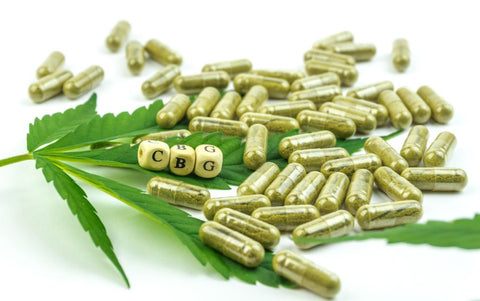16/05/22
CBG, which stands for cannabigerol, is one of over 100 cannabinoids found in hemp and cannabis plants. Young hemp plants produce cannabigerolic acid (CBGA). As the plant matures, CBGA breaks down into cannabidiolic acid (CBDA) and tetrahydrocannabinolic acid (THCA). These two compounds are then converted into CBD and THC. Any CBGA residue is converted into CBG.
Although CBG was first isolated in 1964, this cannabinoid has not received much attention, so there are very few studies on this compound. Modern research is in the pre-clinical stage, but from what we know so far, CBG may have a variety of therapeutic side effects.
It is possible that CBG has strong pain-relieving properties that may be more effective than THC. CBG may interact with the CB1 and CB2 receptors of the endocannabinoid system, which influence inflammation, pain and even heat sensitivity. This cannabinoid may also have antidepressant, anticancer and antibacterial qualities.
Let's explore this compound in detail to discover what it can do for your health and well-being.

Both cannabinoids have the same molecular formula C 21 H 30 O 2 , but they vary in their atomic arrangement. In CBG, the -COOH groups are attached to the carbon atoms in a particular way that gives it a cyclohexene ring. In CBD, two hydrogen atoms are replaced by hydroxyl groups (-OH).
And where do these cannabinoids come from? If you're talking about the strain of cannabis, the answer is simple: they're both phytocannabinoids. They are only found in hemp. If you want to know where they come from in your body, their chemical precursors are produced naturally in the human body, specifically in the terpenophenol pathway of cannabis sativa.
CBG and CBD differ in the way they stimulate appetite. A study conducted on rats showed that CBG encouraged the animals to eat twice as much as their normal intake. In contrast, a study conducted on CBD showed that the cannabinoid significantly reduced total food intake.
CBG is found in smaller amounts than other cannabinoids in cannabis plants. In most strains of the plant, only 1% CBG is found, compared to 20-25% CBD or 25-30% THC1.

CBG is often mistakenly considered psychoactive. But research has shown us that it is not a psychoactive cannabinoid. The way it interacts with the endocannabinoid system (ECS) is different from CBD. CBG has a more direct approach than CBD which has an indirect approach. Because of its inactive nature, it also has many therapeutic benefits.
One of the most compelling results of CBG-related studies is the effect of this compound on brain health. Cannabigerol is perhaps best known for acting as a neuroprotectant that protects us from brain degeneration.
In addition to having the ability to help brain inflammation, CBG promotes neurogenesis - the process of forming new neurons in the brain. This can lead to an increase in the number of brain cells, improved memory, concentration and attention span.

Although research on the CBG is limited, existing studies suggest that it offers several advantages.
GBC may be able to improve the following health problems:
There are a multitude of studies that attest to the fact that taking one cannabinoid in isolation has benefits, however, combining several cannabinoids together has the potential to offer many more. In fact, taking a full spectrum CBD/CBG combination oil, multiplies these benefits exponentially. This is due to the entourage effect, which makes the cannabinoids work better together than individually.
When CBD and CBG are taken together, they balance each other out. CBG acts directly on the receptors, while CBD stimulates the enzyme that produces the body's natural endocannabinoids. Interestingly, when taken alone, people have reported that CBG makes them feel sleepy, while CBD alone gives them energy. So it makes sense that when taken in combination, CBD and CBG balance each other out. The process of taking CBD+CBG oil is very similar to that of CBD oil: It's best to start slowly, keep the same dose for a week or so before increasing it, regularly check your body's pulse during the process, take the oil at the same time each day, and most importantly, be patient. Also, there is no set dose that works best for everyone. Everyone's body is different, so a dose that works for one person may not be as effective for another.
For consumers, the most common way to find CBG is in oil form. By using pure CBG oil, you can get all the benefits of CBG. The bad news is that CBG oils are relatively rare and expensive. However, the good news is that by using broad spectrum CBD oils, you can also get some of the benefits of CBG. All of the cannabinoids found in a cannabis plant, including CBG, are contained in broad spectrum CBD oils. When cannabinoids are used together, they can enhance the potency of each through a mechanism called the entourage effect.

